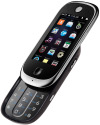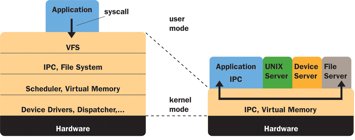Hypervisor spins virtual Android
Jun 4, 2009 — by Eric Brown — from the LinuxDevices Archive — 2 views Open Kernel Labs (OK Labs) is shipping an Android version of its Linux-compatible OKL4 hypervisor. “OK:Android” is an off-the-shelf, paravirtualized version of Android that enables Android to run as a guest operating system (OS) in a secure “hypercell” alongside another phone OS, says the company.
Open Kernel Labs (OK Labs) is shipping an Android version of its Linux-compatible OKL4 hypervisor. “OK:Android” is an off-the-shelf, paravirtualized version of Android that enables Android to run as a guest operating system (OS) in a secure “hypercell” alongside another phone OS, says the company.
(Click for larger view of the Android-ready Samsung I7500)
OK Labs says semiconductor suppliers, mobile OEMs, and mobile network operators (MNOs) face significant challenges in porting and hosting Android. With OK:Android running on top of its OKL4 microkernel-based mobile hypervisor, now termed a “microvisor,” handset manufacturers will have a “short path” to developing and delivering new designs, the company says. It's claimed OK:Android will bring new levels of security and robustness” to Android and make it easier to reuse legacy software in new Android devices.
Specific touted features for OK:Android include:
- New options for creating and prototyping Android-based devices and applications with embedded virtualization
- More secure and robust mobile devices, applications, and services
- Ability to run Android together with other mobile OSes and/or deploy multiple instances of Android on a single device
- Consolidation of baseband and application CPU cores for more aggressive price-points for Android-based handsets
- Enables the OK Labs/Citrix mobile-to-enterprise virtualization (M2E) technology for delivering enterprise applications to mobile devices (see farther below)
In February, OK Labs rival VirtualLogix demonstrated its VLX virtualization stack running Android and a baseband RTOS on an ST-Ericsson reference design with a single ARM9 core. That same month, virtualization giant VMWare demonstrated Android and Windows CE running side by side on a single mobile device. The underlying “Mobile Virtualization Platform (MVP)” technology, which includes a hypervisor only about 20KB in size, is being evaluated by handset manufacturers, said VMWare.
 Motorola Evoke QA4 (Click for details) |
The OKL4 “microvisor”
The Linux-ready OKL4 version 3.0 is available in 300 million handsets and other mobile and embedded devices, including the Linux-based Motorola Evoke QA4 (pictured), says OK Labs. In fact, it is already used in some Android phones, says the company, but until now only on the baseband processor instead of the ARM processor running Android.
OKL4's microkernel OS runs almost everything in userspace, and includes a thin hardware abstraction layer that can support Linux, Windows Mobile, Windows CE, Symbian, and/or other guest OSes. It also includes a minimal POSIX-compliant execution environment, enabling multiple applications and device drivers to run in separate, isolated partitions.
OKL4 provides for decreased bill-of-materials (BOM) costs, as well as the separation of GPL and proprietary software code as required by companies' IP policies, claims OK Labs. The hypervisor provides sufficient CPU performance to support a Linux environment with a rich GUI in one virtualized compartment while concurrently supporting real-time phone modem processing software in a separate compartment, says the company.
For example, the Motorola Evoke QA-4 shown above uses OKL4 to deploy two simultaneously running OSes. The phone is said to be the first commercially available handset to offer a virtualization solution that enables Linux and a real-time operating system (RTOS) to run simultaneously on a single ARM processor.

OKL4 3.0 architecture
In early May, OK Labs and Citrix announced they would deliver the “Citrix Receiver” virtualization client on OKL4. The partnership should let smartphones running Linux, Android, Symbian, and Windows Mobile display secure, virtualized Windows desktop images by the end of the year. The OKL4 version of Citrix Receiver will be targeted primarily at corporate IT departments and their users, who want to access secure corporate data on consumer smartphones, says OK Labs.
In December, OK Labs announced that OKL4 would support devices using ARM Cortex-A8 and Cortex-A9 MP Core multi-core CPUs.
Stated Andreas Constantinou, lead analyst at VisionMobile, “Virtualization technology is being evaluated by many handset OEMs today, primarily for its significant time-to-market benefits for new phone designs.”
Stated Steve Subar, OK Labs CEO, “Both Android and OKL4 are based on dynamic open source projects, both are shipping in volume, and both streamline development through abstraction — Android at the applications level and OKL4 for system software, including Android itself. Together in OK:Android, they offer OEMs, MNOs and ISVs a flexible, portable and secure applications and services platform.”
Availability
OK:Android is available immediately for OEMs, says OK Labs. OK labs will host a webinar, called “Android Migration at the Speed of Light,” on June 9 at 9AM EDT or 6PM EDT. More information and registration may be found here.
This article was originally published on LinuxDevices.com and has been donated to the open source community by QuinStreet Inc. Please visit LinuxToday.com for up-to-date news and articles about Linux and open source.